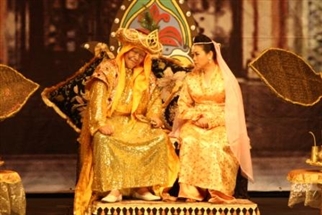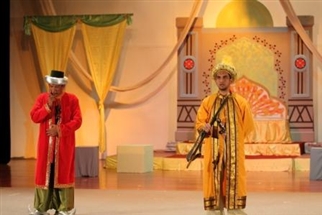History
Around the 1870s, a mobile performance or a travelling theatre group from Bombay came to Penang. This group brought along a genre of popular theatre in India known as Wayang or Teater Parsi (Persian Theatre). The performers consist of men and the language used is Hindustani. This Persian Theatre was well received by multiracial audiences - Malays, Chinese, Tamil, Jawi Peranakan and the Sepoy army that was based in Penang. The audiences were impressed by the mythical and romantic stories from India and the Middle East, that also influenced the use of equipments and sets, amazing costumes, dramatic musical accompaniment and extra-turn.
In the coming years of 1880s, the Persian Theatre became popular in Penang to the extent that Hindustani songs were sung by youngsters. These songs were performed at marriage ceremonies. One of the professional group was formed by Mamat Mashor of Arab descent with Kapitan Ali, a trader. Although it is professional, in the earlier stages of its inception, this group was only active in Penang.
In 1884, Mamak Pushi, a wealthy Persian in Penang, who was impressed with the new theater bought the equipments such as curtains, clothing, musical instruments which belonged to a Persian Theatre which is facing financial problems. Mamak Pushi with his son-in-law, Bai Kassim, has established the Empress Victoria or the Jawi Peranakan Theatrical Company which later to be known as Pushi Indera Bangsawan of Penang.
In addition to the term 'Bangsawan' (nobility) pioneered by Mamak Pushi, other groups that emerged thereafter have used various terms to refer to their theatrical group, such as those known as the Tiruan Wayang Parsi (Persian Imitation Theatre), Malay comedy and Bangsawan. At the end of the twentieth century, the term opera was used. The usage of the term opera may be credited to Western operetta and vaudeville groups, which visited the Malay Peninsula and had influenced the Malay aristocracy. Whatever term is used, the concept of the Persian Theatre still remained intact.

